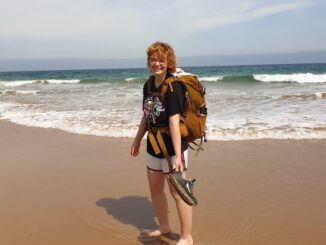
Within a freshman’s first few weeks at Pepperdine University, they must make a decision that will impact not only their entire sophomore year, but potentially their future career.
Every year, 67% of the Pepperdine sophomore class study abroad, where they gain important benefits that can continue to impact their lives into the workforce.
Studying abroad has a high impact on job offers and career advancement because the experience cultivates important life skills such as intercultural skills, curiosity, flexibility, adaptability, confidence and self-awareness, according to the Institute of International Education.
“They [former students] realize a lot of the skills that they cultivated while studying abroad really impacted the work they are doing,” said Harper Matthews, a program manager for the Washington D.C. abroad program who studied abroad in the Buenos Aires program in Spring 2010. “It is going to impact life after graduation.”
Studying abroad is more than just fun memories. It teaches students intercultural competence, flexibility, problem solving and resiliency. Studying abroad can have a positive impact on career advancement and has the ability to make an applicant look more admirable to an employer when seeking a job.
Intercultural competence
When a student first arrives in their host country, they are met with an unfamiliar culture, a new language and many foreign situations, said Beth Laux, executive director for International Programs at Seaver College. Throughout their time abroad, an individual cultivates important cultural sensitivities and skills to help them thrive in their new home. These skills, known as intercultural competence, are later transferable to the workforce.
Laux has worked in international education for 20 years. One of her areas of research is in intercultural competence and how studying abroad helps develop related skills. She studied abroad in Costa Rica in Spring 2000 and then again in Spain in Fall 2001 with Aquinas College.
Intercultural competence refers to a range of skills that allow an individual to effectively relate and communicate with people of other cultures, Laux said.
There are several facets of intercultural competence that are highly marketable, such as the ability to form relationships across culture, enhanced listening and adaptability skills, and being able to recognize patterns, all of which a student can develop while studying abroad.
“Students who have high levels of intercultural competence have the ability to step back and look at different, seemingly unrelated variables and identify patterns,” Laux said. “Combined, all these things are extremely valuable to an employer.”
While abroad, a student interacts with various people and cultures, which allows them to develop new perspectives of the world around them.
Shayla Girardin, now a reporter for ABC 30, studied abroad during Summer 2013 in London. Girardin said studying abroad made her a better worker because it gave her many different experiences to draw from and allowed her to interact with new ideas and people of various cultures.
“I think having that opportunity to go abroad, to get a different culture’s perspectives and, if you can, to experience as many other cultures as possible while abroad is so impactful,” Girardin said. “It really gives you a whole other perspective when you go into the workforce.”
Flexible problem-solving
Throughout a student’s time abroad, they are often faced with difficult and foreign situations that require flexible problem-solving and quick thinking.
Girardin said she was able to gain more independence and confidence in her capabilities as she traveled with a small group of friends on the weekends and was able to successfully navigate through Europe. Even when she had to deal with stressful situations that required a sudden change of plans, Girardin was able to think calmly, be flexible and find a new solution to the problem.
“Going into reporting and being in a job that I’m traveling a lot, or I’m on my own a lot, and have to think quickly on my feet, abroad really helped with those skills,” Girardin said.
Kindergarten teacher Emily Sabino studied abroad in Florence in the academic year 2016-2017. There are often moments abroad when a student is put in an uncomfortable situation, such as missing a train or a plane. Sabino said it was in these moments that she learned to be more flexible and to solve the problems of the changing situations around her.
“When you’re abroad things constantly go wrong,” Sabino said. “In the moment it’s really hard and frustrating but it teaches you to be flexible. I learned how to go with the flow and be flexible when life throws crazy things at me.”
Sabino said her ability to be flexible in various situations is a skill she has used often in her classroom, and was especially helpful to her after COVID-19 disrupted her school’s original education plans.

Adaptability
Similar to the short-term alterations that flexibility teaches, students who study abroad also learn how to adapt to long-term changes.
Arissa Samaniego, coordinator of office operations in International Programs, studied abroad in Buenos Aires for the academic year 2016-2017 and then again in Summer 2017 for the Madrid Upper Division Spanish program.
Samaniego said going abroad helped her to step out of her comfort zone and taught her to take more risks in life. She was able to develop important skills of adaptability, which have been helpful in the workforce.
“You can’t really plan for everything,” Samaniego said. “I used to try to plan for every aspect of my life, but you go abroad and realize that life really can’t be planned like that.”
Elizabeth Chung, an account coordinator for the Pinkston public relations firm in D.C., studied abroad in the D.C. and Buenos Aires programs for the academic year 2018-2019. Chung said both of the abroad programs she participated in helped her to develop long-term adaptability skills, which have aided her in her current job.
“The BA program prepared me for my current role in a nontraditional sense, in that it helped me become adaptable to my situations,” Chung said. “I think that is very crucial in a PR setting because you are always on your feet and ready for the next crisis.”

Resilience
While Pepperdine students often say going abroad is an exciting and life-changing experience, there are also sometimes challenges they must face.
Laux said students sometimes go abroad with certain expectations of what the experience will entail, which can create challenges of integration and adaptation. Employees in International Programs, however, have found that the longer a student is abroad, the more resilience they are able to build, as they learn to navigate through difficult situations.
“If you are willing to work through the challenges, the rewards are just incredible,” Laux said.
Philip Hong, a student service coordinator at Pepperdine University and a law student at Pepperdine University Caruso School of Law, studied abroad in London in Summer 2015.
Hong said his program is known for breaking the most rules while abroad. As Hong did not want to participate in any rule-breaking activities, he was able to form a tight group of like-minded friends and develop close relationships with the faculty.
Hong said going abroad and interacting with students he did not always agree with has helped him in the workforce as it built resilience. Even though he did not always get along with them, Hong said he was still able to interact and deal with his fellow abroad students.
Hong said resilience has helped in his current job as he is often tasked with speaking to difficult parents that are upset for various reasons. Even though they often scream and express their frustration with him, Hong is still able to calmly help the parents in these situations.
“They’re not bad people … they just might be in a time or a moment that is not favorable,” Hong said. “And I can still help them in that moment.”
Matthews said going abroad plays an important role in the development of self and is about one’s personal journey as a person. Students who study abroad are often more open to the unknown, both in jobs and life, because they have experience in dealing with the unknown through traveling to foreign countries and through building resilience.
“It’s an adventure just to step out of your comfort zone,” Matthews said. “In the working world I think that’s important because it really helps our students think on a large scale about what they want to do with their degrees after college.”
Job seeking
The job search for students post-graduation includes them perfecting resumes and beginning the application and interview process. For those who went abroad, they must learn how to incorporate their experiences and abroad skills into their applications to make themselves look more admirable to an employer.
“I think that by going abroad it kinda just shows initiative on applications,” Samaniego said. “It shows that you are willing to take risks and to spend time in a foreign country that you’re not familiar with.”
Samaniego said students can gain different and valuable experiences from going abroad, and it is important to exhibit these skills to potential employers when seeking a job.
Matthews said study abroad experience is a common thing to have on a job application in the United States because many people go abroad. What makes a candidate stand out to an employer, however, is if they can talk about their experience in more ways than just the “shallow” travel aspects.
“I think what makes it give you an edge is if you are able to talk about your abroad experience beyond telling stories of travel or stories of the ‘explicit’ adventure of being in another country,” Matthews said.
Matthews said it is important to talk in an interview about what one learned abroad and make connections between the fun aspects of the experience and the important skills that were learned in the process.
Chung said having gone abroad showed employers that she was willing to take challenges and risks.
“When I talked about how I did a whole homestay program and spoke Spanish for the majority of the time, I think that really perked my employer’s interest,” Chung said. “They know that I’m not afraid of unknown situations and I’m ready to jump in and give it my all.”
Chung said participating in the D.C. abroad program was extremely helpful because it emphasized the importance of networking, which helped her to find a job quickly during the panic of the COVID-19 pandemic.
Katie Emerson completed the reporting for this story in Jour 241 in Fall 2021 under the supervision of Dr. Christina Littlefield and Dr. Theresa de los Santos. Dr. Littlefield supervised the web version of the story.




